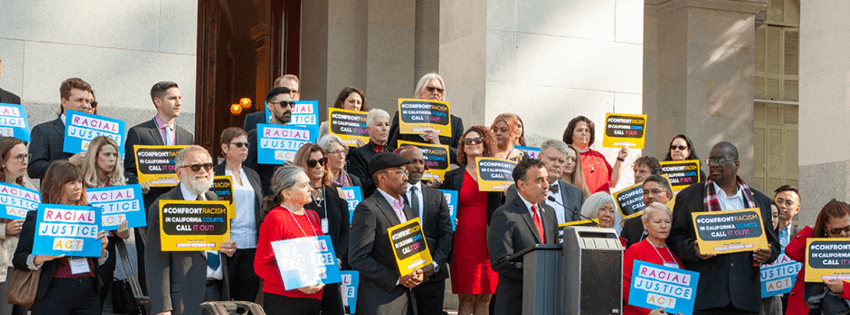
A public database to help ensure a robust implementation of California’s Racial Justice Act
Racial Justice Act
The Racial Justice Act is a California law that prohibits the State from pursuing convictions or sentences based upon race, ethnicity, or national origin. For the RJA to be effective, the public must be able to access policies and data from prosecutors. But this information — which should be readily available — is often difficult to obtain.
Since the law's enactment in 2020, the ACLU, with the support of BraunHagey & Borden LLP, has sought access to prosecutorial records that will ensure a robust implementation of the RJA. The records that we have received, and relevant analyses and court orders, are available here.
Displaying 67 - 72 of 4843 results
Policy or Training Materials
2018.01.16_Alameda County_New Laws 2018, Pt.1.pdf
County
Alameda County
Relevant Date
Upload Date
Source
Office of the Alameda District Attorney
Summary
This document is a training resource from Alameda County authored by the Alameda County District Attorney's Office. This 9-page "Points and Authorities" document accompanies a "weekly video surveillance of criminal law" prepared for CLE purposes. It provides an overview of selected new laws and amendments to existing lawswhich relate to, e.g., changes in youth offender parole eligibility, expansion of crimes requiring sex offender registration, reform of the sex offender registry system, new procedures for testing sexual assault evidence kits, rights of sexual assault victims, and the admissibility of propensity evidence in sex crimes. This document is from January 16, 2018 and was produced by the Alameda County District Attorney's Office on November 3, 2022 in response to a July 23, 2021 PRA request.
Policy or Training Materials
2018.01.22_Alameda County_New Laws 2018, Pt. 2.pdf
County
Alameda County
Relevant Date
Upload Date
Source
Office of the Alameda District Attorney
Summary
This document is a training resource from Alameda County authored by the Alameda County District Attorney's Office. This 10-page "Points and Authorities" document accompanies a "weekly video surveillance of criminal law" prepared for CLE purposes. It continues the review of new laws affecting criminal justice practices in 2018, further discussing legislative changes that impact sentencing, parole, and the rights of crime victims and defendants. This document is from January 22, 2018 and was produced by the Alameda County District Attorney's Office on November 3, 2022 in response to a July 23, 2021 PRA request.
Policy or Training Materials
2018.01.22_Alameda County_New Laws Part 2.mp4
County
Alameda County
Relevant Date
Upload Date
Source
Office of the Alameda District Attorney
Summary
This video is a training resource from Alameda County authored by the Alameda County District Attorney's Office. This is part of a "weekly video surveillance of criminal law" prepared for CLE purposes. It continues the review of new laws affecting criminal justice practices in 2018, further discussing legislative changes that impact sentencing, parole, and the rights of crime victims and defendants. This video is from January 22, 2018 and was produced by the Alameda County District Attorney's Office on November 3, 2022 in response to a July 23, 2021 PRA request.
Policy or Training Materials
2018.02.12_Alameda County_Prop 57 Retroactivity.mp4
County
Alameda County
Relevant Date
Upload Date
Source
Office of the Alameda District Attorney
Summary
This video is a training resource from Alameda County authored by the Alameda County District Attorney's Office. This video is part of a "weekly video surveillance of criminal law" prepared for CLE purposes. It delves into the retroactivity of Proposition 57's juvenile law provisions, as clarified in the California Supreme Court Case People v. Lara explaining Proposition 57's impact on the prosecutorial practice of charging juveniles directly in adult court; and obligations under Marsy's Law related to victim's right to be heard, considering an unpublished decision, Perez v. Superior Court. This video is from February 13, 2018 and was produced by the Alameda County District Attorney's Office on November 3, 2022 in response to a July 23, 2021 PRA request.
Policy or Training Materials
2018.02.13_Alameda County_Prop 57 Retroactivity.pdf
County
Alameda County
Relevant Date
Upload Date
Source
Office of the Alameda District Attorney
Summary
This document is a training resource from Alameda County authored by the Alameda County District Attorney's Office. This 8-page "Points and Authorities" document accompanies a "weekly video surveillance of criminal law" prepared for CLE purposes. It delves into the retroactivity of Proposition 57's juvenile law provisions, as clarified in the California Supreme Court Case People v. Lara explaining Proposition 57's impact on the prosecutorial practice of charging juveniles directly in adult court; and obligations under Marsy's Law related to victim's right to be heard, considering an unpublished decision, Perez v. Superior Court. This document is from February 13, 2018 and was produced by the Alameda County District Attorney's Office on November 3, 2022 in response to a July 23, 2021 PRA request.
Policy or Training Materials
2018.02.19_Alameda County_Humphrey and Bail.mp4
County
Alameda County
Relevant Date
Upload Date
Source
Office of the Alameda District Attorney
Summary
This video is a training resource from Alameda County authored by the Alameda County District Attorney's Office. This is part of a "weekly video surveillance of criminal law" prepared for CLE purposes. It focuses on the implications of the California Supreme Court decision in People v. Humphrey, outlining changes to bail determinations, emphasizing the need for courts to consider defendants' ability to pay and alternative conditions of release that ensure public safety and court appearance; and WIC 8013, and the prosecutor's role when an individual seeks the return of firearms after a 5150 detention. This video is from February 20, 2018 and was produced by the Alameda County District Attorney's Office on November 3, 2022 in response to a July 23, 2021 PRA request.
